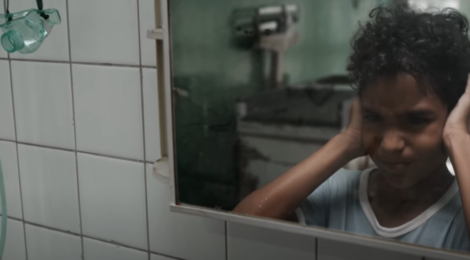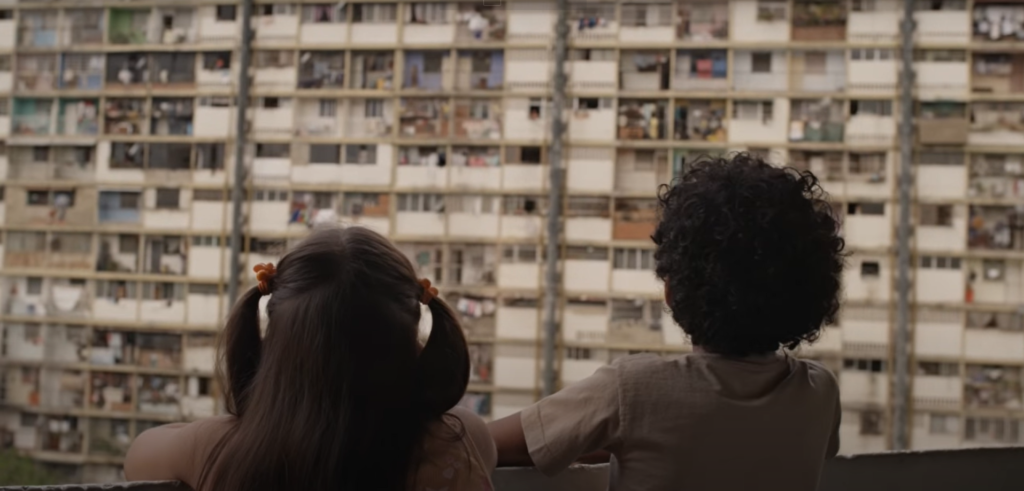
Contextualising the “Malo” in the Venezuelan film Pelo Malo (Mariana Rondón, 2013)
Today, and belatedly for Black History month, Mediático is delighted to present a piece by regular contributor Natália Pinazza on the Venezuelan film Pelo Malo (Mariana Rondón 2013). Pelo Malo will be part of the Screening the Child: The Child’s Gaze in Spanish Language cinema, taking place today Monday 1st March, https://www.eventbrite.co.uk/e/screening-the-child-spanish-film-club-tickets-135142088625 Dr Pinazza (@DrNPinazza), lecturer in Portuguese Studies at Exeter University, will be part of the Zoom Webinar Round Table Discussion at 18:00 GMT
Pelo Malo, the critically appraised film by Mariana Rondón, centres on the life of a nine-year-old boy, Junior, who is chastised by his mother for his obsession with straightening his hair and performing. The film, whose title literally translates as “bad hair” a term which has historically been used to denigrate Afro-textured curls, situates Venezuela’s long history of racism, traditional patriarchal paradigms, and homophobia in the context of the social unrest of the past decade.
Pelo Malo is an international co-production incorporating Venezuela, Peru, Argentina, Germany (Berlin Film Festival’s World Cinema Fund) and other European countries (Ibermedia) and has been distributed globally. Although this transnational funding structure means that Pelo Malo is inserted into both local and global contexts, and there are aspects of colonialist voyeurism in the way it screens a poverty-stricken Caracas, the film also provides fresh insight into local anxieties over gender norms and racial issues. Pelo Malo encourages spectatorial identification with the child protagonist through the extensive use of point-of view shots, thereby creating an empathetic subject-viewer relationship with Junior. The film resonates with recent trends in Latin American cinema (e.g. Mexican Roma, Brazilian Que horas ela volta?, Argentine Cama Adentro) in which political reality is filtered through the personal experiences of characters in the domestic sphere. Despite its primary focus on private and personal events, Pelo Malo turns its attention outwards to public political events through the use of sound and footage of televised events, including for instance, of Hugo Chávez’ supporters shaving their heads in solidarity with their leader’s struggle with cancer and news of femicide.
Sounds of gunshots, people shouting, and traffic noise are superimposed in sequences where actions take place in the house interiors, indicating a reality beyond the frame of the camera. The diversity of shots typical of documentary work and its neorealist portrayal of the streets are bolstered by the use of nonprofessional actors and less staged scenes of people going about their lives in Caracas. Shots of graffiti and street art contextualise the film politically as the handheld camera follows Junior’s mother in search of work. The spectator also gets a glimpse of the external world of the children, whose games mimic the world outside, incorporating rape and violence as part of the interaction amongst dolls.

The film also includes footage of Venezuela Beauty Pageants, alluding to the legacy of “whitening policies” in South American countries during the nineteen century and epitomised by often tall and fair skinned beauty queens. By showing the influence of Beauty Pageants on the characters, Pelo Malo emphasises how Junior’s obsession with straightening his afro-hair is rooted in the political, cultural and economic implications of the aesthetic values resulting from the historical association between European superiority and civilisation.
Junior’s hair becomes a palimpsest over and through which Pelo Malo explores racial issues as well as gender norms. Because of his desire to dance and straighten his hair, Junior is looked down on by his mother and others around him and even called “marica”, a derogatory term used to insult gay men. It is worth noting that Brazilian president Bolsonaro has recently used the term “marica” to state that Brazil is a “country of maricas” (“country of sissies”) over coronavirus, which reveals how ideologies of gender that seek to exclude individuals from the patriarchal national narrative continue to inform contemporary politics in South America.[1]
As part of the film’s concern with gendering discourses, the act of getting Junior and his friend getting pictures taken becomes a way of charting the children’s negotiation of ideologies of gender – as the neighborhood photographer explains girls are to be photoshopped as beauty queens whereas boys are to be photoshopped as soldiers. Junior doesn’t want to be photographed as a solder, however, but as a singer with blow dried hair. By straightening his long hair and eschewing the short back and sides of the military haircut, Junior disrupts binary gender structures. In fact, fatherhood and the military are strongly linked in the film as it turns out Junior’s late father was a soldier. Junior, a name given to boys who are named after their father, signals the model of masculinity Junior is expected to follow. However, in Pelo Malo, it is not only Junior who falls short of the expectations dictated by gender norms. His friend also fails to meet the beauty pageant standard and his mother struggles to get back her security guard job, which is commonly a more masculine role. Like Junior, who is often asking questions and does not fully understand what he did wrong or why he is in someway inadequate, the spectator joins the plot in medias res and is not granted explanations of why the mother was fired, details about an incident that happened during carnival nor the exact circumstances of the death of Junior’s father.
There is considerable attention to Junior’s family structure, including his white baby brother, absent father, unemployed mother and his afro-Venezuelan grandmother. The latter is more tolerant of Junior’s non conforming ways and sees the differences between Junior and his father in a positive light. She thinks that unlike her dead son, the boy has more chance of surviving for not complying with the model of violent masculinity seemingly required by the government. It is in his grandmother’s house where Junior carves space to straighten his hair and perform. His grandmother is also the only one who provides Junior with references to black culture, more specifically Henry Stephen’s rendition of Mi Limón, Mi Limonero, a song based on Brazilian folk song (Meu limão, meu limoeiro made popular by Wilson Simonal). However, Junior ends up rejecting his grandmother as he gradually internalises his mother’s set of values. Junior is chastised by his mother for not fitting into models of machismo. She takes him to the doctor to check if he is ill, invades his private space in fear Junior will do anything she deems inappropriate and even engages in sexual acts in front of the child as an attempt to provide him with a male role model. Therefore, questions of gender in Pelo Malo revolve around the tension between two female subjects, his mother and grandmother, who respectively sanction and reject patriarchal models of masculinity, epitomised by the absent father figure.
The link between dominant gender paradigms and hair is played out in the film’s closing sequence, in which an almost hairless Junior does not sing along to the national anthem with the other school children. After the closing sequence, the film introduces a video of Junior dancing with his straight hair, the image that he had initially envisaged for his picture. The credits juxtapose the video, and the montage obstructs the narrative progression from the final sequence, allowing free rein to Junior’s self-expression. Through editing, the film provides an alternative, albeit unlikely ending, thereby channelling its prescriptive transition from oppression to freedom and undermining the violent masculinity, which has marked the countries’ contemporary history.
Pelo Malo is included in Amazon Prime
[1] https://www.independent.co.uk/news/world/americas/brazil-coronavirus-cases-jair-bolsonaro-president-b1721337.html






